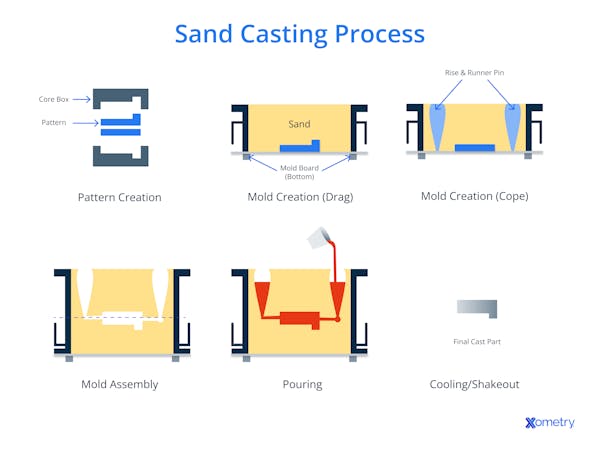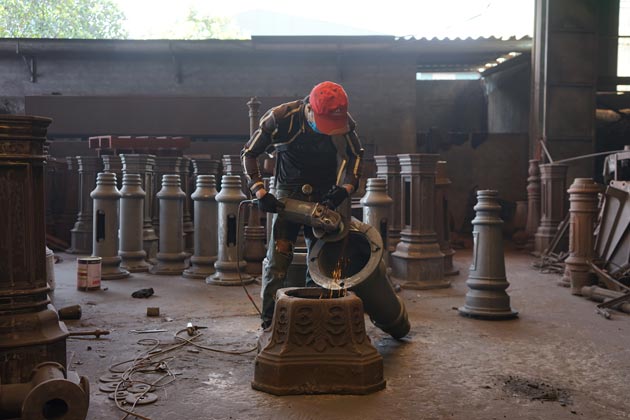Aluminum Foundry Wisconsin ensures reliable casting performance
Understanding the Conveniences and Innovations in the Aluminum Foundry Sector
The Aluminum Foundry industry plays a crucial function in contemporary production. Its light-weight residential or commercial properties notably improve fuel efficiency, especially in aerospace and automotive fields. Furthermore, Aluminum's resistance to deterioration warranties longevity in different applications. As the sector evolves, technologies such as advanced recycling and additive production are improving production techniques. Checking out these improvements exposes not just the advantages however likewise the obstacles ahead for Aluminum factories in a quickly altering market.
The Lightweight Benefit of Aluminum
Aluminum's lightweight nature uses significant benefits across different industries, specifically in manufacturing and transportation. Its low density enables the production of parts that are much easier to set up and take care of, causing decreased labor prices and enhanced efficiency. In the automobile field, lighter cars contribute to boosted gas economy and lower emissions, aligning with global sustainability goals. Likewise, in aerospace, making use of Aluminum lowers the overall weight of airplane, which is critical for enhancing performance and reducing operational prices.
In addition, Aluminum's light-weight properties promote innovative designs that were previously impossible with heavier products. This versatility allows manufacturers to develop complicated forms and frameworks while maintaining structural stability. In general, the light-weight benefit of Aluminum not just enhances product efficiency but additionally drives advancements in modern technology and style, making it a recommended product in numerous applications.
Rust Resistance and Sturdiness
The Aluminum Foundry sector is renowned for creating materials with remarkable rust resistance, making them excellent for various applications. This home, incorporated with boosted architectural honesty, adds to the lasting efficiency advantages that Aluminum elements provide. Therefore, industries progressively depend on Aluminum to satisfy demanding ecological conditions without endangering top quality.
Superior Corrosion Resistance
While various metals face considerable difficulties from ecological variables, Aluminum stands apart for its superior deterioration resistance, making it a recommended option in many applications. This residential or commercial property is mainly because of an all-natural oxide layer that bases on the Aluminum surface area, supplying an obstacle against wetness and harsh representatives. Unlike other steels that may corrosion or break down over time, Aluminum preserves its integrity also in rough environments, such as coastal locations or industrial settings. In addition, its lightweight nature integrated with corrosion resistance makes it perfect for applications in aerospace, automotive, and marine sectors. Overall, Aluminum's outstanding longevity not just enhances item longevity however likewise reduces upkeep expenses, offering an engaging advantage for consumers and makers alike.
Improved Structural Integrity
Engineers and developers progressively acknowledge the value of boosted structural integrity in modern-day applications, where both rust resistance and longevity are essential. Aluminum alloys, understood for their light-weight homes, likewise exhibit remarkable resistance to rust, making them suitable for harsh environments. The cutting-edge methods used in the Aluminum Foundry sector add significantly to generating elements with boosted durability. Advanced casting procedures and alloy structures are tailored to fulfill particular performance needs, making sure that structures can stand up to extreme problems without compromising stability. In addition, surface therapies and coverings boost the life expectancy of Aluminum products, even more mitigating degeneration with time. This emphasis on boosted structural stability not just expands the usability of materials however likewise lowers upkeep costs, solidifying Aluminum's position as a product of choice in various industries.
Durable Efficiency Advantages
Durable efficiency in Aluminum elements is mostly credited to their premium rust resistance and resilience. Unlike several steels, Aluminum normally creates a protective oxide layer, which protects against rust and wear and tear in various settings, including aquatic and industrial settings. This fundamental building significantly prolongs the lifespan of Aluminum products, reducing maintenance and replacement costs. Additionally, the light-weight nature of Aluminum enhances its applicability throughout sectors without jeopardizing toughness. The material's resistance to damage likewise contributes to its reliability sought after applications, making it a perfect choice for vehicle, aerospace, and construction sectors. As markets increasingly focus on sustainability and longevity, Aluminum's performance advantages align with modern engineering demands, strengthening its duty in innovative production processes.
Environmental Effect and Sustainability
 As the Aluminum Foundry sector evolves, it progressively prioritizes environmental influence and sustainability, acknowledging the need for responsible techniques in the face of environment adjustment. Efforts to minimize waste and power intake go to the center, with many factories embracing recycling campaigns to recover Aluminum scrap. This not just minimizes resources use however likewise notably cuts down energy expenditure, as recycled Aluminum needs just a fraction of the energy contrasted to key production.
As the Aluminum Foundry sector evolves, it progressively prioritizes environmental influence and sustainability, acknowledging the need for responsible techniques in the face of environment adjustment. Efforts to minimize waste and power intake go to the center, with many factories embracing recycling campaigns to recover Aluminum scrap. This not just minimizes resources use however likewise notably cuts down energy expenditure, as recycled Aluminum needs just a fraction of the energy contrasted to key production.Additionally, developments in emissions regulate modern technologies are being applied to decrease air pollutants, straightening operations with more stringent ecological laws. Factories are likewise checking out different energy resources, such as solar and wind, to power their centers sustainably. By promoting collaboration with stakeholders, the market intends to create cutting-edge services that boost ecological stewardship. Jointly, these campaigns highlight a commitment to lowering the Aluminum Foundry's carbon impact while promoting a round economy within the production field.
Advanced Manufacturing Techniques
 Revolutionizing production processes, the Aluminum Foundry sector is increasingly incorporating advanced production techniques to improve effectiveness and precision. Strategies such as computer numerical control (CNC) machining and additive production have arised as vital components in maximizing manufacturing process. CNC machining permits high-precision element construction, substantially decreasing material waste and production time. On the other hand, additive her latest blog production opens new avenues for intricate geometries and lightweight designs that were previously tough to attain.
Revolutionizing production processes, the Aluminum Foundry sector is increasingly incorporating advanced production techniques to improve effectiveness and precision. Strategies such as computer numerical control (CNC) machining and additive production have arised as vital components in maximizing manufacturing process. CNC machining permits high-precision element construction, substantially decreasing material waste and production time. On the other hand, additive her latest blog production opens new avenues for intricate geometries and lightweight designs that were previously tough to attain.Furthermore, the deployment of automation and robotics in Aluminum shops enhances operations, minimizes human error, and enhances employee safety. These innovations facilitate a more responsive manufacturing environment, enabling producers to adjust quickly to market demands. The assimilation of advanced simulation software program better boosts the layout and testing stages, resulting in premium item top quality. Jointly, these techniques not just boost operational efficiency yet also foster technology, positioning the Aluminum Foundry market at the center of modern-day manufacturing.
Innovations in Reusing Processes
The Aluminum Foundry industry is not just progressing in manufacturing techniques but is additionally making significant strides in reusing procedures. Innovations are emerging to enhance the performance of reusing techniques, reducing energy consumption and improving sustainability. Advanced arranging modern technologies, such as computerized optical sorting, enable the identification and splitting up of Aluminum from various other materials with high accuracy. This results in a better of recycled Aluminum, which is important for keeping the integrity of the final items.
Closed-loop recycling systems are being carried out, allowing suppliers to reuse Aluminum scrap within their very own manufacturing processes. This lessens waste and promotes a round economy. Additionally, research right into new recycling techniques, such as hydrometallurgical procedures, supplies the potential for recouping Aluminum from complicated waste streams. These advancements not only add to lowering the carbon impact of the Aluminum Foundry market however additionally bolster its economic viability in a progressively eco conscious market.
Applications Across Numerous Industries
Many markets are significantly acknowledging the convenience and advantages of Aluminum Foundry items, resulting in extensive applications throughout fields such as automotive, aerospace, customer, and building and construction products. In the automobile industry, Aluminum castings add to light-weight car styles, improving gas performance and efficiency. Aerospace suppliers make use of Aluminum parts for their strength-to-weight ratio, vital for aircraft frameworks and parts.
In building, Aluminum is favored for its sturdiness and resistance to rust, making it optimal for window frameworks, roofing, and architectural assistances. Customer products likewise gain from Aluminum Foundry items, as seen in kitchenware, electronics, and packaging, where lightweight and recyclable materials are essential.
The flexibility of Aluminum Foundry techniques enables for intricate designs and accurate requirements, catering to the varied needs of these markets. Therefore, Aluminum Foundry products are becoming important to modern-day manufacturing procedures throughout numerous fields.
Future Trends in Aluminum Foundries
As markets continue to advance, Aluminum factories are poised to accept several essential patterns that guarantee to enhance efficiency and sustainability. One famous pattern is the boosting adoption of digital innovations, including automation and expert system, which enhance operations and boost quality assurance. Additionally, the push towards lasting practices is leading foundries to purchase reusing innovations, considerably decreasing waste and power intake.
 An additional arising trend is using sophisticated alloys and products, satisfying the expanding demand for sturdy and light-weight parts throughout different industries (Aluminum Foundry). The combination of additive manufacturing techniques is anticipated to reinvent component style, offering modification and decreasing lead times.
An additional arising trend is using sophisticated alloys and products, satisfying the expanding demand for sturdy and light-weight parts throughout different industries (Aluminum Foundry). The combination of additive manufacturing techniques is anticipated to reinvent component style, offering modification and decreasing lead times.Partnership with research institutions is also expected to drive technology, as shops look for to develop new processes and materials. Aluminum Foundry. Jointly, these fads indicate a transformative future for the Aluminum Foundry market, aligning with wider objectives of sustainability and efficiency
Frequently Asked Concerns
What Are the Typical Prices Connected With Aluminum Foundry Manufacturing?
The common prices connected with Aluminum Foundry production include raw products, labor, energy, equipment upkeep, and overhead expenses. These aspects collectively affect the total monetary investment required for effective Aluminum casting operations.
How Does Aluminum Contrast to Various Other Metals in Stamina?
Aluminum, while lighter than several steels, shows impressive strength-to-weight ratios. Contrasted to steel, Aluminum is much less strong however supplies superb rust resistance, making it a favorable option in applications where weight and resilience are crucial.
What Safety Procedures Are in Location in Aluminum Foundries?
Safety and security steps in Aluminum foundries usually consist of necessary personal protective devices, ventilation systems to control additional hints fumes, routine devices upkeep, training programs for workers, and adherence to stringent security policies to reduce dangers connected with molten metal handling.
Just How Is Quality Control Managed in Aluminum Spreading Processes?
Quality link control in Aluminum casting processes involves extensive evaluations at numerous stages, consisting of resources examination, process tracking, and last item testing. Methods such as statistical procedure control and non-destructive screening warranty adherence to industry criteria.
What Certifications Are Necessary for Aluminum Foundry Distributors?
The importance of accreditations for Aluminum Foundry providers includes ISO 9001 for quality management, ISO 14001 for ecological administration, and industry-specific criteria like ASTM and SAE, guaranteeing conformity, safety, and integrity in producing procedures.
The Aluminum Foundry market plays a vital function in contemporary manufacturing. The Aluminum Foundry industry is renowned for producing products with remarkable deterioration resistance, making them excellent for numerous applications. Reinventing manufacturing procedures, the Aluminum Foundry industry is increasingly incorporating advanced manufacturing techniques to boost effectiveness and accuracy. The Aluminum Foundry industry is not only progressing in manufacturing strategies however is also making substantial strides in recycling processes. As industries proceed to evolve, Aluminum foundries are positioned to welcome numerous key fads that promise to enhance efficiency and sustainability.